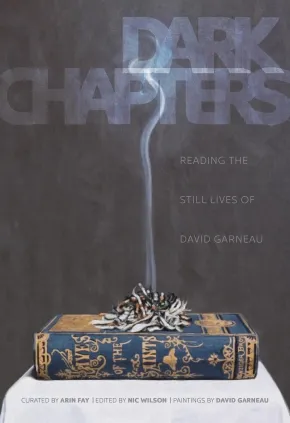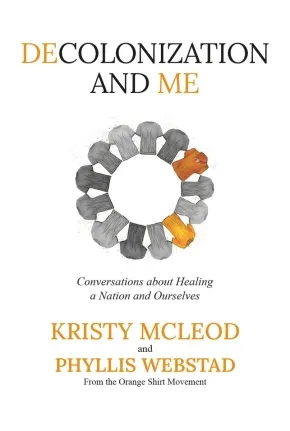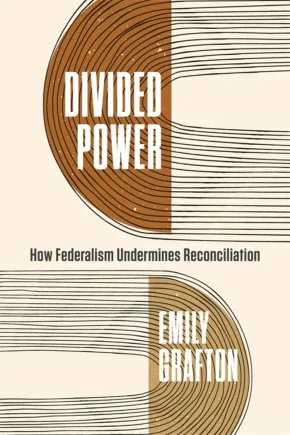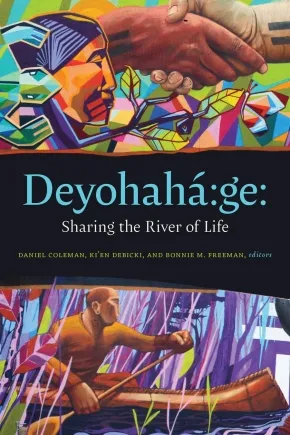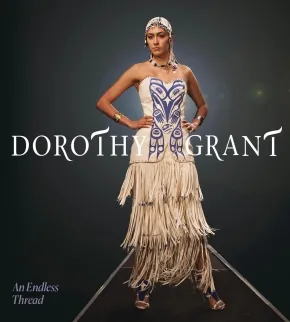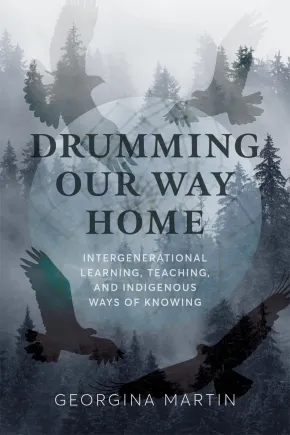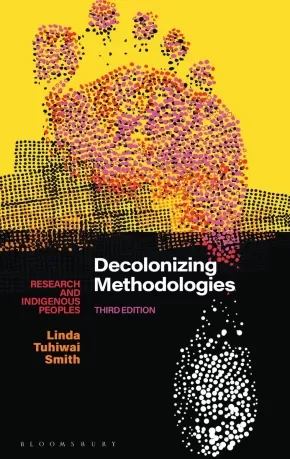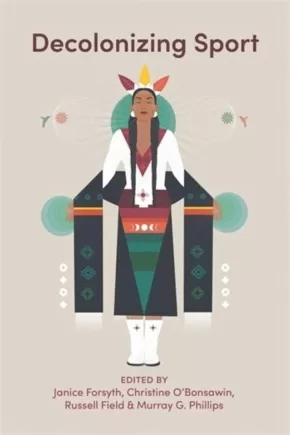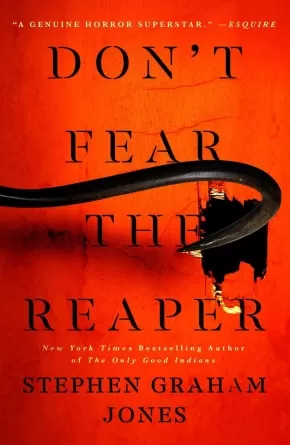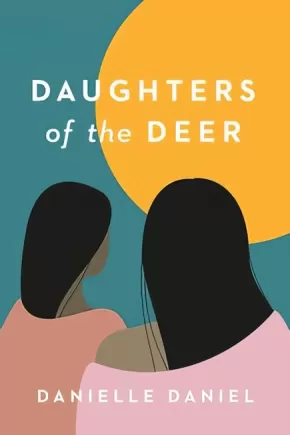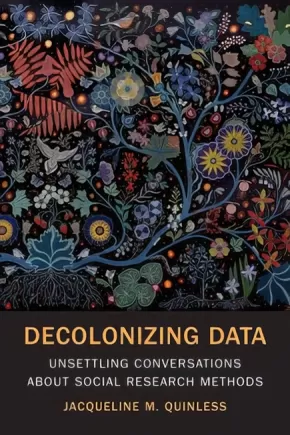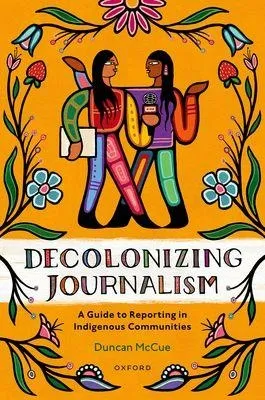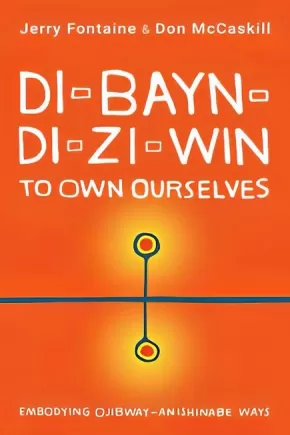
Browse Books for Adults
1
-
15
of
49 Results; (Books Starting With "D")
Sort By
Go To
of 4
Dark Chapters: Reading the Still Lives of David Garneau
$32.95
Artists:
Editors:
● Arin Fay
Format:
Paperback
Text Content Territories:
Indigenous Canadian; Métis;
ISBN / Barcode: 9781779400536
Synopsis:
Synopsis:
A singular collection of responses to the still life paintings of acclaimed artist David Garneau
Dark Chapters brings together 17 poets, fiction writers, curators, and critics to engage with the works of David Garneau, the Governor General’s Award-winning Métis artist. Featuring paintings from Garneau’s still life series “Dark Chapters” alongside poetry, fiction, critical analysis, and autotheory, the book includes contributions from Fred Wah, Paul Seesequasis, Jesse Wente, Lillian Allen, Billy-Ray Belcourt, Larissa Lai, Susan Musgrave, and more.
A nod to the Reports of Truth and Reconciliation Commission, in which Justice Murray Sinclair describes the residential school system as “one of the darkest, most troubling chapters in our nation’s history,” Garneau’s still life paintings combine common objects (books, bones, teacups, mirrors) and less familiar ones (a Métis sash, a stone hammer, a braid of sweetgrass) to reflect the complexity of contemporary Indigenous experiences. Provocative titles like “Métis in the Academy” and “Smudge Before Reading” invite consideration of the mixed influences and loyalties faced by Indigenous students and scholars. Other paintings explore colonialism, vertical and lateral violence, Christian influence on traditional knowledge, and museum treatment of Indigenous belongings.
Rooted in Garneau’s life-long engagement at the intersections of visual art and writing, Dark Chapters presents a multifaceted reflection on the work of an inimitable, unparalleled artist.
Includes contributions from Arin Fay, Billy-Ray Belcourt, Cecily Nicholson, David Howes, Dick Averns, Fred Wah, Jeff Derksen, Jesse Wente, John G. Hampton, Larissa Lai, Lillian Allen, Paul Seesequasis, Peter Morin, Rita Bouvier, Susan Musgrave, Tarene Thomas, and Trevor Herriot.
Reviews
“A smart collection of art and essays, Dark Chapters activates deep conversations about art, resistance, and sovereignty. Visiting with paintings by Métis artist David Garneau, seventeen poets, curators, and thinkers offer complex provocations that trouble and activate new forms of communities and relationships.” —Dr. Carmen Robertson, Canada Research Chair in North American Indigenous Visual and Material Culture
“Provocative, probing, and precarious, Dark Chapters pairs the poetic, literary, political, and critical responses of seventeen authors with the deceptively uncluttered yet gravid and combustible still lifes of David Garneau. This collection of pictures and words undertakes a necessary examination of the uncanny oppositions and disquieting literal and symbolic inversions that signify and animate the Indigenous history of Canada.” —Bonnie Devine
“Dark Chapters is a lesson in relationality and innovation. Built through conversations between Garneau’s work and artists/writers, the intergenerational contributors to this book come together in relation to Garneau and his still lives to explore the important contribution the artist has made to Canadian, Indigenous, and International art.” —Erin Sutherland
Educator Information
Table of Contents
Foreword
Nic Wilson
Still Life
John G. Hampton
Stone and Rock: I Have Failed You
Peter Morin
Wander Carried
Cecily Nicholson
On Kinship
Paul Seesequasis
Learning from Indigenous Academic Solidarity
Jeff Derksen
Knock Knock
Lillian Allen
Unsettling the Colonial Gaze
Trevor Herriot
Smudge Before Reading and The Land Does Not Forget
Tarene Thomas
Confession (after David Garneau) by Rita Bouvier
Fuse and Formal and Informal Education
Jesse Wente
The Problem with Pleasure
Billy-Ray Belcourt
Métis Realism: On the Materiality of Smoke and Relationality of Rocks
David Howes
Allies (after Hsieh and Montano)
Larissa Lai
Ally Tear Reliquary
Arin Fay
Understanding Attempted Enlightening: Between Language as Power…and Light as Life
Dick Averns
Spine
Fred Wah
The Resting Heartbeat of a Wounded Bird
Susan Musgrave
Gallery
About the Artist
About the Curator
About the Editor
About the Contributors
List of Artworks
Index
Additional Information
160 pages | 6.50" x 9.50" | 58 colour illustrations | Paperback
Decolonization and Me: Conversations about Healing a Nation and Ourselves
$30.99
Text Content Territories:
Indigenous Canadian; First Nations; Salish; Interior Salish; Secwepemc (Shuswap); Stswecem'c Xgat'tem; Métis;
Reading Level: N/A
ISBN / Barcode: 9781778540684
Synopsis:
Synopsis:
This book invites readers to step into a space of reflection on your personal relationship with truth, reconciliation, and Orange Shirt Day.
Written in response to the increase of residential school denialism, Phyllis Webstad and Kristy McLeod have collaborated to create a book that encourages readers to face their own biases. This book challenges readers through a series of sensitive conversations that explore decolonization, Indigenization, healing, and every person’s individual responsibility to truth and reconciliation. Centered around the Orange Shirt Day movement, and a National Day for Truth and Reconciliation, these conversations encourage readers to unpack and reckon with denialism, biases, privilege, and the journey forward, on both a personal and national level.
Within each chapter, Phyllis Webstad draws on her decade of experience (sharing her Orange Shirt Story on a global level and advocating for the rights of Indigenous Peoples) to offer insights on these topics and stories from her personal journey, which co-author and Métis scholar, Kristy McLeod, helps readers to further navigate. Each section includes real denialist comments taken from social media and Kristy's analysis and response to them. Through empathy-driven truth-telling, this book offers an opportunity to witness, reflect, heal, and be intentional about the seeds we hope to plant for the future, together.
Additional Information
350 pages | 5.70" x 8.25" | Hardcover
Divided Power: How Federalism Undermines Reconciliation
$32.00
Format:
Paperback
Reading Level: N/A
ISBN / Barcode: 9781773637723
Synopsis:
Synopsis:
Reconciliation, as set out by the Truth and Reconciliation Commission, is a process of understanding the Canadian state's genocide against Indigenous Peoples and creating a new relationship between Indigenous Peoples and settlers based on mutual respect and dignity. Given the racism and paternalism embedded in the Canadian state and related institutions, building such a relationship is a monumental task, but in addition, there is a major structural roadblock in the way: federalism, the political system that organizes Canadian governance.
Divided Power argues that Canada’s system of federalism, rooted in settler colonialism, has dispossessed Indigenous Peoples for settler benefit. Far from being a neutral, balanced way to distribute responsibilities and powers, the division between the state and provinces and territories obstructs Indigenous Peoples’ agency and governance. Under such coercive political exclusion, how can truth and reconciliation be fully achieved? Emily Grafton meticulously traces the ways that federalism limits the potential for reconciliation and proposes alternative power-sharing models.
Guiding readers through the terrain of debate, Grafton deftly and accessibly merges a political analysis of federalism with a clear assessment of settler colonialism to argue that reconciliation will be incomplete for as long as the current division of powers persists. Divided Power points to a promising approach to holding the Canadian state responsible for integrating the principles of truth and reconciliation into its very foundation.
Reviews
“Emily Grafton explores Canadian federalism – not the usual division of powers between the federal and provincial governments, but between the colonized and the colonizer. Federalism, Grafton argues, was informed by Indigenous political frameworks but has been torqued by colonial assumptions about Indigenous inferiority so as to require colonial dominance and Indigenous subordination. This book is a useful antidote to the complacent endorsement of the settler state status quo, so prevalent in scholarship and in politics.” - Joyce Green, Ktunaxa Nation, Professor Emerita, University of Regina; Elder-Auntie, CPSA Reconciliation Committee
“Grafton exposes the evolution and coloniality of Canadian federalism in its unjust and mundane efforts to diminish Indigenous sovereignties. Divided Power is a tour de force of alternatives, and you’ll never think of federalism the same way after reading it!” - Ajay Parasram, author of Pluriversal Sovereignty and the State
Additional Information
192 pages | 6.00" x 9.00" | Paperback
Dangling in the Glimmer of Hope: Academic Action on Truth and Reconciliation
$41.95
Format:
Paperback
Text Content Territories:
Indigenous Canadian;
ISBN / Barcode: 9780776644660
Synopsis:
Synopsis:
Dangling in the Glimmer of Hope: Academic Action on Truth and Reconciliation demonstrates actions academics have taken in relation to some of the Calls to Action of the Truth and Reconciliation Commission. Poetry, short stories, and children’s stories sit alongside scholarly chapters, mixing personal and academic voices to challenge and engage both the head and the heart about what Truth and Reconciliation—and the Calls to Action—require of us all.
Garry Gottfriedson, Victoria Handford, and their collaborators invite readers not only to explore the diverse facets of Indigenous identity, but also to embark on a transformative, collective journey towards mutual understanding and respect.
Contributions by Dorothy Cucw-la7 Christian, Georgann Cope Watson, Garry Gottfriedson, Victoria (Tory) Handford, Sarah Ladd, Patricia Liu Baergen, Tina Matthew, Rod McCormick, Gloria Ramirez, Fred Schaub, and Bernita Wienhold-Leahy.
Educator Information
Table of Contents
Land Acknowledgement
In Your Canada—A Thousand and Counting by Garry Gottfriedson
About the Cover Photograph
List of Poems
List of Figures
List of Tables
Foreword by Dorothy Cucw-la7 Christian
Introduction by Garry Gottfriedson and Victoria Handford
SECTION 1
Language and Culture Calls to Action
Returning from School by Garry Gottfriedson
Disrupting Colonial Practices through Indigenous Language Learning and Research by Gloria Ramirez
SECTION 2
Health Calls to Action
lessons by Garry Gottfriedson
Grave Concerns by Rod McCormick
A Walk Together by Bernita Wienhold-Leahy
Health Care Practices by Bernita Wienhold-Leahy
SECTION 3
Education for Reconciliation Calls to Action
KIRS Curriculum by Garry Gottfriedson
Change Begins with a Whisper by Georgann Cope Watson
SECTION 4
Business and Reconciliation Calls to Action
Too Much by Sarah Ladd
Cultural Dissonance: Job Interviewing and Indigenous Candidates by Sarah Ladd
SECTION 5
Commemoration Calls to Action
An Unholy Act by Garry Gottfriedson
Debwewin by Victoria Handford
Red Bridge by Victoria Handford
SECTION 6
Newcomers to Canada Calls to Action
The Flesh of Ice by Garry Gottfriedson
Encounters by Fred Schaub
Reconciliation and Decolonization: From the Shadows of Settler Shame to the Generosity of an Ethical Relationality by Fred Schaub
Exploring Curriculum as a Lived Experience of Poetic Dwelling in between Place Stories by Patricia Liu Baergen
Afterword by Tina Matthew
Contributors
Appendices
Additional Information
232 pages | 6.00" x 9.00" | 20 photos | Paperback
Deyohaha´:ge: Sharing the River of Life
$34.99
Format:
Paperback
Text Content Territories:
Indigenous Canadian; First Nations; Haudenosaunee (Iroquois); Cayuga; Kanyen'keha:ka (Mohawk); Oneida (Onyota'a:ka); Onondaga; Seneca; Tuscarora;
Reading Level: N/A
ISBN / Barcode: 9781771126472
Synopsis:
Synopsis:
How people today create respectful relationships through peace and friendship.
Deyohahá:ge:, “two roads or paths” in Cayuga language, evokes the Covenant Chain-Two Row Wampum, known as the “grandfather of the treaties.” Famously, this Haudenosaunee wampum agreement showed how Indigenous people and newcomers could build peace and friendship by respecting each other’s cultures, beliefs, and laws as they shared the river of life.
Written by members of Six Nations and their neighbours, this book introduces readers not only to the 17th-century history of how the Dutch and British joined the wampum agreement, but also to how it might restore good relations today. Many Canadians and Americans have never heard of the Covenant Chain or Two Row Wampum, but 200 years of disregard have not obliterated the covenant. We all need to learn about this foundational wampum, because it is resurging in our communities, institutions, and courthouses—charting a way to a future.
The writers of Deyohahá:ge delve into the eco-philosophy, legal evolution, and ethical protocols of two-path peace-making. They tend the sacred, ethical space that many of us navigate between these paths. They show how people today create peace, friendship, and respect—literally—on the river of everyday life.
Reviews
"Deyohahá:ge: brilliantly reminds us of our obligations and responsibilities to one another, and the more-than-human world. It shows that pathways can only be forged by respecting the waters, earth, fires, and skies through which all creation travels.” - John Borrows, Loveland Chair in Indigenous Law, University of Toronto
Educator & Series Information
This book is part of the Indigenous Imaginings series.
Table of Contents
The Words That Come Before All Else
Acknowledgements
Introduction, Daniel Coleman, Ki’en Debicki, and Bonnie Freeman
Section One: Original Instructions
Gä•sweñta’ Reflections. Oren Lyons
Where the Roots Touch: tsi niyothahinen ne Tehontatenentshonteronhtáhkwa, Amber Meadow Adams
Wunnáumwash: Wampum Justice, Kelsey Leonard The Chain, Naturally Understood, Kayanesenh Paul Williams
Section Two: Learning from the River
Guswenta Space: An Invitation to Dialogue, David Newhouse
Navigating the Two Row in the Academy, Vanessa Watts
Two Rows of Reconciliation, Rick Hill
Below Decks in the Covenant: Blackness in the Two Row Tradition, Phanuel Antwi
Towards Peace: Living in the Three White Rows of the Two Row”, Sarah General
Section Three: Living on the River
The Pen Pal Project: Bridging the Divide with the Teachings of the Two Row Wampum Treaty,” Susie Miller and Scot Cooper
Deyohahage Gihe gowa’hneh: Living the Two Row Wampum, on the Grand River, Ellie Joseph and Jay Bailey
The Deep and Rippling Consciousness of Water: The Transition of Youth Experiences with the Two Row on the Grand River Paddle, Bonnie Freeman and Trish van Katwyk
Contributors
Endnotes
Bibliography
Glossary
Index
Additional Information
336 pages | 6.00" x 9.00" | Paperback
Dorothy Grant: An Endless Thread
$50.00
Artists:
Format:
Hardcover
Text Content Territories:
Indigenous Canadian; First Nations; Haida; Raven Clan;
Reading Level: N/A
ISBN / Barcode: 9781773272412
Synopsis:
Synopsis:
Part look-book, part memoir, and part history, this beautifully illustrated monument to a singular designer who helped inspire the growing Indigenous fashion movement is also a powerful demonstration of the enduring resonance and possibilities of Haida art.
Inspired by a discussion with celebrated Haida artist Bill Reid, Haida designer Dorothy Grant made it her life's mission to bring her culture's traditional art into contemporary fashion while adhering to the principle of Yaguudang, or respect for oneself and others. The 1989 launch of her Feastwear collection, featuring modern silhouettes hand-appliquéd with Northwest Coast formline, immediately established her at the forefront of Indigenous fashion in North America, and she has since hosted runway shows and trunk sales from Paris to Vancouver to Tokyo. Her clients include Indigenous leaders, national politicians, and global celebrities, and her garments can be found in museums and galleries around the world, including the Metropolitan Museum of Art.
Dorothy Grant: An Endless Thread is the first monograph to celebrate her trailblazing career. It features new photography of dozens of garments spanning the past four decades, modeled in studio and natural settings in Vancouver and Haida Gwaii, alongside sketches, traditional button robes and spruce-root weaving, and personal stories and reflections from Grant. Essays by Haida repatriation specialist and museologist Sdahl Ḵ'awaas Lucy Bell and curator India Rael Young place Grant in the long continuum of Haida fashion and trace the many innovations and accomplishments of her journey, and Haida curator and artist Kwiaahwah Jones, a longtime assistant to Grant, shares behind-the-scenes insights and memories. An associated exhibition, Dorothy Grant: Raven Comes Full Circle, opened at Haida Gwaii Museum in July 2024.
Educator Information
The publisher notes this work is from Dorothy Grant in collaboration with the Haida Gwaii Museum. Contributors to this work include:
- Sdahl Ḵ’awaas Lucy Bell
- Taa.uu ’Yuuwans Nika Collison
- Kwiaahwah Jones
- India Rael Young
Additional Information
168 pages | 9.44" x 10.35" | Hardcover
Drumming Our Way Home: Intergenerational Learning, Teaching, and Indigenous Ways of Knowing
$29.95
Format:
Paperback
Text Content Territories:
Indigenous Canadian; First Nations; Salish; Interior Salish; Secwepemc (Shuswap);
Reading Level: N/A
ISBN / Barcode: 9780774870092
Synopsis:
Synopsis:
What does it mean to be Secwepemc? And how can an autobiographical journey to recover Secwepemc identity inform teaching and learning? Drumming Our Way Home demonstrates how telling, retelling, and re-storying lived experiences not only passes on traditional ways but also opens up a world of culture-based learning.
Georgina Martin was taken from her mother not long after her birth in a segregated tuberculosis hospital. Her experience is representative of the intergenerational trauma inflicted by the Canadian state on Indigenous peoples. Here she tells her story and invites Elder Jean William and youth Colten Wycotte to reflect critically on their own family and community experiences. Together they journey, exchanging thoughts about personal and collective identity, culture and language, and the challenging process of gaining traditional knowledge.
This process of reaching into memories not only uncovers the pain of separation from culture but also provides a powerful example of reconnection through healing, affirmation, and intergenerational learning. Throughout this journey, Georgina Martin is guided by her hand drum, reflecting on its use as a way to uphold community protocols and honour teachings.
Drumming Our Way Home is evidence of the value of storytelling as pedagogy, demonstrating that it can offer vital lessons in teaching, learning, and meaning making.
This significant contribution to Indigenous pedagogical methodology is an excellent resource for educators, education students, and eduational policy makers. It should also be read by scholars and students in Indigenous studies and anthropology. Those in the helping fields of social work and health, education, and sociology will find the narrative of a personal healing journey inspiring and informative.
Reviews
"By expertly weaving her personal and lived experiences with that of an Elder and a youth, Georgina Martin’s book is a step toward our own sense of validation and healing. Especially in light of the Truth and Reconciliation report and the 94 Calls to Action, this is critical work."— Sheila Cote-Meek, director, Indigenous Educational Studies Programs, Brock University
"Georgina Martin’s voice, hand drumming, and ideas about individual and collective cultural identity, intergenerational learning and healing, and reconciliation are vibrant, far-reaching, and need to be shared widely ... [Drumming My Way Home] offers hope and possibility for finding one’s way to a meaningful concept of home and for contributing to concrete actions of reconciliation."— From the foreword by Jo-ann Archibald, author of Indigenous Storywork: Educating the Heart, Mind, Bo
Educator Information
Table of Contents
Table of Contents
Foreword / Jo-ann Archibald
Preface
1 Drumming as Metaphor
2 The Drum Reverberates against the Intergenerational Aspects of Colonialism
3 Honouring the Drummer: Embodied Knowledge from within my community
4 Elder Jean’s Stories: Passing the Drum Forward to the Next Generation
5 Colten’s Stories: Memories and Values
6 Intergenerational Knowledge Transmission
Notes; References; Index
Additional Information
176 pages | 6.00" x 9.00" | 7 b&w photos, 1 map | Paperback
Decolonizing Methodologies: Research and Indigenous Peoples - 3rd Edition
$39.50
Format:
Paperback
Text Content Territories:
Indigenous;
Reading Level: N/A
ISBN / Barcode: 9781350346086
Synopsis:
Synopsis:
To the colonized, the term 'research' is conflated with European colonialism; the ways in which academic research has been implicated in the throes of imperialism remains a painful memory.
This essential volume explores intersections of imperialism and research - specifically, the ways in which imperialism is embedded in disciplines of knowledge and tradition as 'regimes of truth.' Concepts such as 'discovery' and 'claiming' are discussed and an argument presented that the decolonization of research methods will help to reclaim control over indigenous ways of knowing and being.
Now in its eagerly awaited third edition, this bestselling book includes a co-written introduction features contributions from indigenous scholars on the book's continued relevance to current research. It also features a chapter with twenty-five indigenous projects and a collection of poetry.
Educator Information
Table of Contents
Introduction to the Third Edition
Foreword
Introduction
1. Imperialism, History, Writing and Theory
2. Research through Imperial Eyes
3. Colonizing Knowledges
4. Research Adventures on Indigenous Land
5. Notes from Down Under
6. The Indigenous People's Project: Setting a New Agenda
7. Articulating an Indigenous Research Agenda
8. Twenty-Five Indigenous Projects
9. Responding to the Imperatives of an Indigenous Agenda: A Case Study of Maori
10. Towards Developing Indigenous Methodologies: Kaupapa Maori Research
11. Choosing the Margins: The Role of Research in Indigenous Struggles for Social Justice
12. Getting the Story Right, Telling the Story Well: Indigenous Activism, Indigenous Research
Conclusion: A Personal Journey
Twenty Further Indigenous Projects
Poems
Index
Additional Information
352 pages | 5.28" x 8.35" | 3rd Edition | Paperback
Decolonizing Sport
$29.00
Format:
Paperback
Text Content Territories:
Indigenous Peoples in Africa; Indigenous New Zealander; Indigenous Canadian; Indigenous Australian; Indigenous American; Indigenous;
Reading Level: N/A
ISBN / Barcode: 9781773636344
Synopsis:
Synopsis:
Indigenous Peoples have taken physical recreational activity – sport – back from the colonizers. One of very few books to show the two edges of sport: it colonized but is now decolonizing.
Decolonizing Sport tells the stories of sport colonizing Indigenous Peoples and of Indigenous Peoples using sport to decolonize. Spanning several lands — Turtle Island, the US, Australia, Aotearoa/New Zealand and Kenya — the authors demonstrate the two sharp edges of sport in the history of colonialism. Colonizers used sport, their own and Indigenous recreational activities they appropriated, as part of the process of dispossession of land and culture. Indigenous mascots and team names, hockey at residential schools, lacrosse and many other examples show the subjugating force of sport. Yet, Indigenous Peoples used sport, playing their own games and those of the colonizers, including hockey, horse racing and fishing, and subverting colonial sport rules as liberation from colonialism. This collection stands apart from recent publications in the area of sport with its focus on Indigenous Peoples, sport and decolonization, as well as in imagining a new way forward.
Educator Information
Table of Contents
Sport, Colonialism and Decolonization (Janice Forsyth, Christine O’Bonsawin, Murray G. Phillips and Russell Field)
Section 1: Storytelling Beyond Competition: An Indigenous Perspective on Organized Sport (Brian Rice)
More Than a Mascot: How the Mascot Debate Erases Indigenous People in Sport (Natalie Welch)
Section 2: Interrogating the Archive Witnessing Painful Pasts: Understanding Images of Sports at Canadian Indian Residential Schools (Taylor McKee and Janice Forsyth)
On the Absence of Indigenous Moving Bodies: Whiteness, Decolonization and Indigenous/Indigenizing Sport History (Malcolm MacLean)
Section 3: Rights and Reconciliation # 87: Reconciliation, Sport History and Indigenous Peoples in Canada (Victoria Paraschak)
Taken at Face Value: The Legal Feasibility of Indigenous-Led Olympic Games (Christine O’Bonsawin)
Section 4: Settler Colonialism Canoe Races to Fishing Guides: Sport and Settler Colonialism in Mi’kma’ki (John Reid)
Moments of Transcending Colonialism? Rodeos and Races in Lethbridge (Robert Kossuth)
“Men Pride Themselves on Feats of Endurance”: Masculinities and Movement Cultures in Kenyan Running History (Michelle M. Sikes)
Section 5: Resistance and Activism Stealing, Drinking and Non-Cooperation: Sport, Everyday Resistance in Aboriginal Settlements in Australia (Gary Osmond)
Let’s Make Baseball! Practices of Unsettling on the Recreational Ball Diamonds of Tkaronto/Toronto (Craig Fortier and Colin Hastings)
Subjugating and Liberating at Once: Indigenous Sport History as a Double Edged Sword (Brendan Hokowhitu)
Additional Information
256 pages | 6.00" x 9.00" | Paperback
Don't Fear the Reaper
$34.99
Format:
Hardcover
Text Content Territories:
Indigenous American; Native American;
ISBN / Barcode: 9781982186593
Synopsis:
Synopsis:
December 12th, 2019, Jade returns to the rural lake town of Proofrock the same day as convicted Indigenous serial killer Dark Mill South escapes into town to complete his revenge killings, in this riveting sequel to My Heart Is a Chainsaw from New York Times bestselling author, Stephen Graham Jones.
Four years after her tumultuous senior year, Jade Daniels is released from prison right before Christmas when her conviction is overturned. But life beyond bars takes a dangerous turn as soon as she returns to Proofrock. Convicted Serial Killer, Dark Mill South, seeking revenge for thirty-eight Dakota men hanged in 1862, escapes from his prison transfer due to a blizzard, just outside of Proofrock, Idaho.
Dark Mill South’s Reunion Tour began on December 12th, 2019, a Thursday.
Thirty-six hours and twenty bodies later, on Friday the 13th, it would be over.
Don’t Fear the Reaper is the page-turning sequel to My Heart Is a Chainsaw from New York Times bestselling author Stephen Graham Jones.
Series Information
This is the second book in The Indian Lake Trilogy.
Additional Information
464 pages | 5.50" x 8.37" | Hardcover
Daughters of the Deer
$24.00
Format:
Paperback
Text Content Territories:
Indigenous Canadian; First Nations; Anishinaabeg; Algonquin; Haudenosaunee (Iroquois);
Reading Level: N/A
ISBN / Barcode: 9780735282087
Synopsis:
Synopsis:
In this haunting and groundbreaking historical novel, Danielle Daniel imagines the lives of women in the Algonquin territories of the 1600s, a story inspired by her family’s ancestral link to a young girl who was murdered by French settlers.
1657. Marie, a gifted healer of the Deer Clan, does not want to marry the green-eyed soldier from France who has asked for her hand. But her people are threatened by disease and starvation and need help against the Iroquois and their English allies if they are to survive. When her chief begs her to accept the white man’s proposal, she cannot refuse him, and sheds her deerskin tunic for a borrowed blue wedding dress to become Pierre’s bride.
1675. Jeanne, Marie’s oldest child, is seventeen, neither white nor Algonquin, caught between worlds. Caught by her own desires, too. Her heart belongs to a girl named Josephine, but soon her father will have to find her a husband or be forced to pay a hefty fine to the French crown. Among her mother’s people, Jeanne would have been considered blessed, her two-spirited nature a sign of special wisdom. To the settlers of New France, and even to her own father, Jeanne is unnatural, sinful—a woman to be shunned, beaten, and much worse.
With the poignant, unforgettable story of Marie and Jeanne, Danielle Daniel reaches back through the centuries to touch the very origin of the long history of violence against Indigenous women and the deliberate, equally violent disruption of First Nations cultures.
Reviews
“Danielle Daniel renders the stories of her ancestors vividly, poetically and with deep love and respect. Daughters of the Deer gives long overdue voices to the Indigenous women who came before. A subtle, moving demonstration of how colonization attempted to strip Indigenous women of their power and place, and a testament to the enduring strength and wisdom that no colonial power could extinguish.” —Jessica McDiarmid, author of Highway of Tears: A True Story of Racism, Indifference and the Pursuit of Justice for Missing and Murdered Indigenous Women and Girls
Additional Information
344 pages | 5.25" x 8.00" | Paperback
Decolonizing Data: Unsettling Conversations about Social Research Methods
$26.95
Format:
Paperback
Text Content Territories:
Indigenous Canadian;
Grade Levels: University/College;
ISBN / Barcode: 9781487523336
Synopsis:
Synopsis:
Decolonizing Data explores how ongoing structures of colonialization negatively impact the well-being of Indigenous peoples and communities across Canada, resulting in persistent health inequalities. In addressing the social dimensions of health, particularly as they affect Indigenous peoples and BIPOC communities, Decolonizing Data asks, Should these groups be given priority for future health policy considerations?
Decolonizing Data provides a deeper understanding of the social dimensions of health as applied to Indigenous peoples, who have been historically underfunded in and excluded from health services, programs, and quality of care; this inequality has most recently been seen during the COVID-19 pandemic.
Drawing on both western and Indigenous methodologies, this unique scholarly contribution takes both a sociological perspective and the "two-eyed seeing" approach to research methods. By looking at the ways that everyday research practices contribute to the colonization of health outcomes for Indigenous peoples, Decolonizing Data exposes the social dimensions of healthcare and offers a careful and respectful reflection on how to "unsettle conversations" about applied social research initiatives for our most vulnerable groups.
Reviews
"Decolonizing Data is a valuable resource and guide to taking a decolonized critical approach to Indigenous research for practitioners, academics, and researchers. The book notably takes an important stance in discussing and executing allyship in Indigenous research in an important area of health and wellness. Jacqueline M. Quinless offers a unique case study that is very helpful for non-Indigenous researchers who are wanting to engage with Indigenous research in a respectful way."— Lisa Monchalin, Professor of Criminology, Kwantlen Polytechnic University
"Decolonizing Data is clear and concise. The literature is sound and conducted in a professional manner. This book will be useful in courses on decolonizing approaches, Indigenous methodologies, methods, health and well-being, social sciences, and research practices." — Michael Lickers, Associate Faculty and Indigenous Scholar in Residence, School of Leadership Studies, Royal Roads University
Additional Information
172 pages | 6.00" x 9.00" | 1 b&w map, 5 b&w figures, 5 b&w tables | Paperback
Decolonizing Journalism: A Guide to Reporting in Indigenous Communities
$69.99
Format:
Paperback
Text Content Territories:
Indigenous Canadian;
Reading Level: N/A
ISBN / Barcode: 9780190164263
Synopsis:
Synopsis:
Recent events including the Truth and Reconciliation Commission and the discovery of mass graves at the sites of former residential schools have brought increased coverage of Indigenous Peoples to Canada's mainstream media outlets. However, there is no guide for current and aspiring journalists to building respectful and reciprocal relationships with Indigenous people and communities when researching and sharing their stories. Written by a leading Indigenous journalist, Duncan McCue, specifically for journalism students in Canada, Decolonizing Journalism delivers practical, up-to-date advice in a guidebook-like text that students will use throughout their studies and careers. Readers will learn how to develop a critical consciousness when engaging with and reporting on Indigenous communities, and will draw insights into the histories, processes, and obstacles central to decolonizing journalism from exclusive interviews with 9 leading Indigenous journalists.
Educator Information
Decolonizing Journalism guides students through building critical consciousness vis-à-vis Indigenous people and communities, teaches them how to apply their journalistic skills and minds to working with communities, and offers 9 exclusive interviews with leading Indigenous journalists and podcasters in Canada and the United States.
With this text, students will gain insight into the histories, processes, and obstacles central to decolonizing journalism and media from the inside out.
Table of Contents
A Brief History of Indigenous Relations in Canada
Chapter 1: At the Desk
Chapter 2: In the Field
Chapter 3: On the Air
Chapter 4: Teachings
4.1 Becoming Trauma-Informed – A Conversation with Connie Walker
4.2 Lessons in Humility – A Conversation with Waubgeshig Rice
4.3 “In Love With My People” – A Conversation with Mark Trahant
4.4 Northern Reflections – A Conversation with Juanita Taylor
4.5 Respect and Relationships – A Conversation with Tanya Taylor
4.6 In Pursuit of Truth – A Conversation with Karyn Pugliese
4.7 Punching Up – A Conversation with Tim Fontaine
4.8 The Need for Knowledge-Based Journalism – A Conversation with Merelda Fiddler-Potter
4.9 Asking Hard Questions – A Conversation with Tristan Ahtone
Conclusion: The Last Word
Appendix 1: UNDRIP Articles Relating to Media
Appendix 2: TRC Calls to Action Relating to Media
Appendix 3: OCAP Principles for Indigenous Research and Data Collection
Appendix 4: Residential School Apology
Additional Information
232 pages | 6.12" x 9.25" | Paperback
Dempsey Bob: In His Own Voice
$45.00
Format:
Hardcover
Text Content Territories:
Indigenous Canadian; First Nations; Dene; Tahltan (Nahanni); Tlingit;
Grade Levels: 12; University/College;
ISBN / Barcode: 9781773271613
Synopsis:
Synopsis:
Dempsey Bob: In His Own Voice is based on the first full-scale solo museum exhibition of this extraordinary Tahltan-Tlingit artist, one of the finest living carvers of the Northwest Coast. Drawing from extensive interviews with the artist by the exhibition’s curator, Sarah Milroy, the book presents the story of his life told his own way, including extensive and intimate reflections on the creation of particular works. Gorgeous photographs of the artworks, which are drawn from key private collections in Canada and public collections in Canada, the US and beyond, are supplemented with material from his sketchbooks to create a vivid portrait of the creative process.
Additional Information
208 pages | 9.00" x 10.00" | Hardcover
Di-bayn-di-zi-win (To Own Ourselves): Embodying Ojibway-Anishinabe Ways
$24.99
Format:
Paperback
Text Content Territories:
Indigenous Canadian; First Nations; Anishinaabeg; Ojibway;
Grade Levels: 12; University/College;
ISBN / Barcode: 9781459748996
Synopsis:
Synopsis:
A collaboration exploring the importance of the Ojibway-Anishinabe worldview, use of ceremony, and language in living a good life, attaining true reconciliation, and resisting the notions of indigenization and colonialization inherent in Western institutions.
Indigenization within the academy and the idea of truth and reconciliation within Canada have been seen as the remedy to correct the relationship between Indigenous Peoples and Canadian society. While honourable, these actions are difficult to achieve given the Western nature of institutions in Canada and the collective memory of its citizens, and the burden of proof has always been the responsibility of Anishinabeg.
Authors Makwa Ogimaa (Jerry Fontaine) and Ka-pi-ta-aht (Don McCaskill) tell their di-bah-ji-mo-wi-nan (Stories of personal experience) to provide insight into the cultural, political, social, and academic events of the past fifty years of Ojibway-Anishinabe resistance in Canada. They suggest that Ojibway-Anishinabe i-zhi-chi-gay-win zhigo kayn-dah-so-win (Ways of doing and knowing) can provide an alternative way of living and thriving in the world. This distinctive worldview — as well as Ojibway-Anishinabe values, language, and ceremonial practices — can provide an alternative to Western political and academic institutions and peel away the layers of colonialism, violence, and injustice, speaking truth and leading to true reconciliation.
Reviews
"Fontaine and McCaskill write in a way our own Indigenous People can understand and feel; their passion is tangible." — Graham Hingangaroa Smith, Distinguished Professor, Massey University - NZ
"There are multiple ways to inhabit our deepest principles. There are also many ways to honor land and our elders by embodying the teachings of both. Here is life found in kindness, loving, and truth. How do we access healing and how do we share this healing with others? Reading this book is one way. Tears of gratitude are for you both, Jerry Fontaine and Don McCaskill. Mahalo nui no ko ?ike nahenahe. Thank you for this mutual emergence shaped as much by friendship as it is by ?ike kupuna - elder knowledge. What is within these pages are ceremonial gifts offered to all who will take the time to connect with what is inevitable about our collective evolution." — Manulani Aluli Meyer, University of Hawai‘i
Additional Information
328 pages | 6.00" x 9.00" | Paperback
Sort By
Go To
of 4

